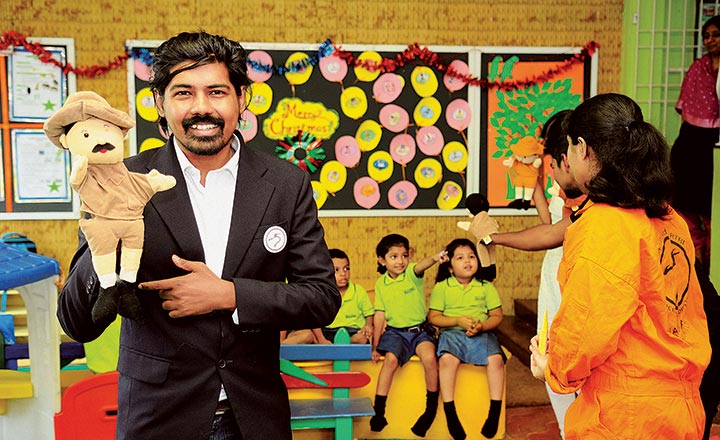The one about the crow that stole a vada from a granny and lost it to the fox is an evergreen bedtime story. But, can it be ‘upgraded’, enough to teach children concepts in aeronautics? The team from Vaayusastra, an educational start-up, shows it can be.
Theatre artists from the Chennai-based company tell the story a bit differently. For example, during its flight, the crow comes across a helicopter after reaching an altitude of over 3.5 km. Now, the grasping bird wants not just the vada, but also a helicopter. So, a genie appears and helps it build one, while imparting lessons in aeronautics. There is more. The crow finally reaches the moon and now the students are taken for a virtual reality (VR) tour around the moon. Children sit through the session riveted, and leave it thoroughly entertained and a bit more familiar with the science of flight and engineering.
Incubated at IIT Madras, Vaayusastra combines theatre and science to make learning aeronautics fun and effective for children. “We mix visual demonstration, storytelling and technical insights. A child would understand at least one of the three,” says Jagadeesh Kanna, founder of Vaayusastra.
An aeronautical engineering graduate who hails from Thanjavur, Kanna was initially working as a research and development engineer at a company that manufactured vibration isolaters for ISRO, after completing his studies in 2012. With a passion for dance and theatre, he joined a group named Theatre Y in a year and started writing scripts. Soon, he got a call for a movie. Life seemed to be going well, so he quit his job wanting to focus on his artistic career full time.
Then, things turned topsy-turvy, and the movie never took off. “I come from a middle class family with many responsibilities resting on my shoulders. I was now the most insecure person in the world,” Kanna remembers.
Quite interestingly, he knew to make about 50 varieties of paper planes and decided to put that skill to use. He started conducting paper plane workshops for children at theatre companies. This was when the founder of his theatre group put forward a suggestion — why not present stories in his workshop? For example, in Ramayana, Ravana kidnaps Sita in pushpakavimana, which essentially is an aeroplane. Kanna built on it and decided to explain science through these tales. “For example, Ravana would be speaking from the cockpit of pushpakavimana, at which point we explain the meaning and history of a cockpit and so on,” Kanna says.
Kanna approached schools with these workshops and he was given suggestions to introduce modern characters such as Shin-chan or Superman, with whom kids could relate to more.
Meanwhile, he approached the Indian Institute of Technology-Madras (IIT-M) incubation centre, which initially turned him down saying that his business idea was not scalable. But after a year of following up, he became a part of Rural Technology and Business Incubator (RTBI) in January 2018. In April 2018, he incorporated the company as Vaayusastra and started hiring more aeronautical engineers and theatre artists.
The team started a programme called air science workshop, where they combined the National Council of Educational Research and Training (NCERT) syllabus with work done at the National Aeronautics and Space Administration (NASA) to create lessons in aeronautics for children. Kanna started writing scripts for workshops that covered three grades —1 to 3, 4 to 6 and 7 to 9 and designed it as a 12-session certification programme.
Responses from schools improved and those such as Navbharat, and ones run by Velammal Group and Vedanta Group came on board. Vaayusastra’s workshops are set to be part of the curriculum at Velammal schools next year, according to Kanna.
Organised in schools, cultural hubs and at IIT, Vaayusastra’s programme costs Rs.3,500 per kid. The workshop which started in November has so far seen over 150 registrations.
With 15 clients in Chennai, Kanna is planning to scale up next to Thanjavur, Kumbakonam, Madurai and Tiruchirappalli. Currently, a 10-member team with about 15-20 theatre artists freelancing for them, the start-up also plans to hire for its expansion. “At Velammal, with 1,000 students, we would charge Rs.500 per kid per month for nine months. That would bring in Rs.4.5 million from one school. We have agreed for a 50-50 revenue share deal with two schools,” Kanna says, adding that they charge only Rs.70 per child in government schools. “We customise accordingly and bring down the costs. In other schools, we give DIY kits to every student.” Vaayusastra which started to work with school on a trial basis will become part of the regular curriculum from the next year.
The start-up has also recently started a programme called Science on Stage, where the play is enacted in a much grander scale. Three editions have been completed now and, interestingly, characters include Aladdin, Jackie Chan and even Tesla.
“My vision is simple,” says Kanna. “Most kids are in awe of aeroplanes. I want to make these machines more approachable. I want children to see that these machines are like any other, even like a cycle rickshaw.” He hopes that this approach will encourage more children to innovate in aeronautical engineering.











